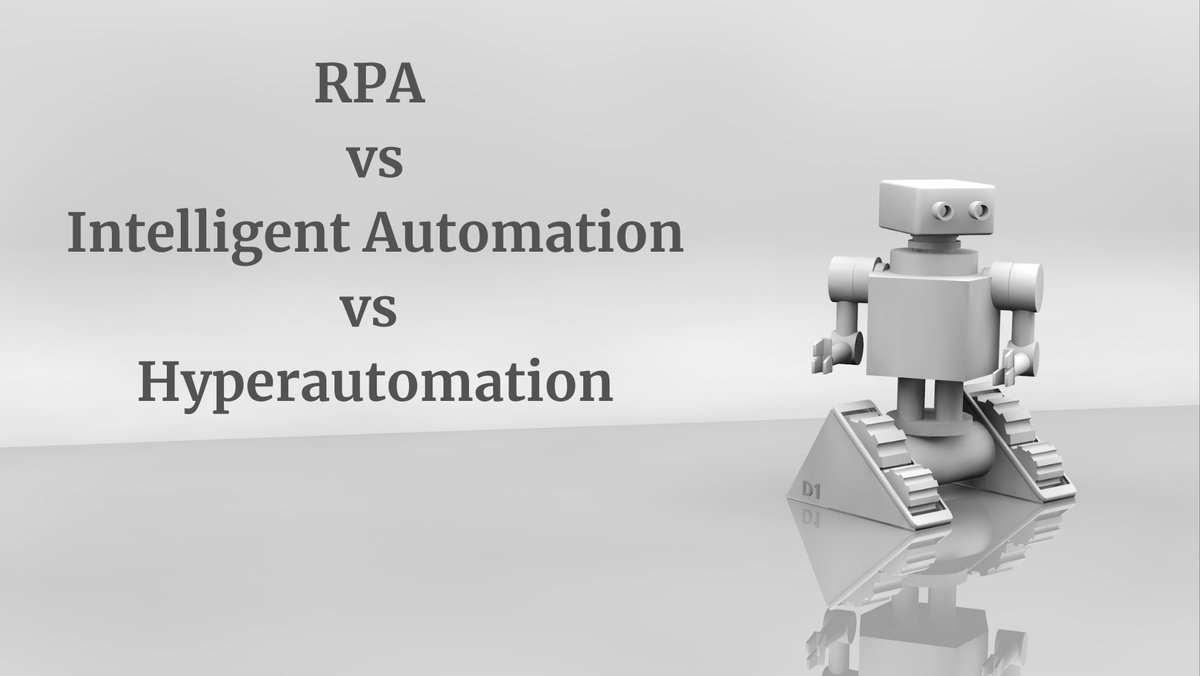In the digital world, automation is revolutionizing, and most firms are eager to adopt it in their operations. However, most businesses find it challenging to select an appropriate automation software. Robotic Process Automation (RPA), Intelligent Automation, and Hyperautomation, are three automation techniques that can be challenging to differentiate and understand. Most likely, it will be challenging to figure out the software before acquiring them. Additionally, you will requir prior knowledge before adopting; else, the outcomes may be complicated. As a result, the article offers an in-depth comparison to help you choose the best automation software for your project.
- RPA( Robotic Process Automation)
- Intelligence Automation
- Hyperaytomation
Let's know them in-depth and find a suitable technique for your project.
What is RPA?
Robotic process automation (RPA) is a software technology that streamlines business operations, with the help of software robots. These robots, developed by an RPA developer, mimic human interactions with digital devices and software, making the work easing and speeding up complex tasks. The RPA program can do suitable keystrokes, recognize and extract data, grasp on-screen content, and perform numerous predetermined jobs, much like people can. However, they work continuously without requiring breaks or pauses, these robots are robots are faster than people in terms of speed and consistency.
Benefits of RPA
- Increased efficiency
- Cost savings
- Enhanced scalability
- Faster processing times
- Compliance and Auditability
- Employee Empowerment
What is Intelligent Automation?
Intelligent automation is a cutting-edge technology which is the combination of the most revolutionizing technologies such as RPA, machine learning(ML), and artificial intelligence (AI) to automate business processes and boost operational efficiency by enabling decision-making abilities.
Benefits of Intelligent Automation
- Increased efficiency
- Greater agility
- Improved quality
- Greater safety
- Improved customer experience
- Data-driven insights
What is Hyperaytomation?
Hyperautomation is a systematic approach that involves identifying, assessing, and automating business processes using a range of advanced technologies. It operates on a framework of evolving tools and technologies designed to accommodate the scaling needs of enterprises. The primary objective is to optimize automation for both current and future workflows, ensuring ongoing efficiency without introducing additional complexities.
Benefits of Hyperautomation
- Increased operational efficiency
- Scalability and flexibility
- End-to-end process automation
- Improved decision-making
- Improved accuracy and quality
- Enhanced customer experience
RPA vs intelligent automation vs Hyperautomation
|
RPA |
Intelligence Automation |
Hyperautomation |
|
|
Focus |
Tasks like rule-based and repetitive automation are specified in the same application. |
IA takes the help of RPA and AI capabilities to manage unstructured data and make decisions. |
It takes the help of numerous technologies to make automation for business processes. |
|
Complexity |
Implementation is effortless and easy |
It becomes more complex because of using AI capabilities |
It uses a complex and compressive approach to make automation. |
|
Impact |
Provides efficiency and minimizes errors while making any task or process. |
Helps to make effective decisions and increase productivity. |
The main aim is to transform and optimize the enterprises. |
|
Core Technologies |
RPA uses a rule-based automation process for every task. |
AI(Artificial Intelligence), ML(machine learning), NLP(natural language processing) |
Hyperautomation uses AI/ML, including OCR and NLP |
Summary
In conclusion, Hyperautomation emerges as the primary area of attention for future advancements when comparing the approaches of RPA, Intelligent Automation, and Hyperautomation. At the same time, Hyperautomation offers a tremendous deal to help organizations succeed in a competitive marketplace by enhancing customer service and making efficient use of resources.
Also Read: Key RPA Use Cases for various Industries.


No comments yet